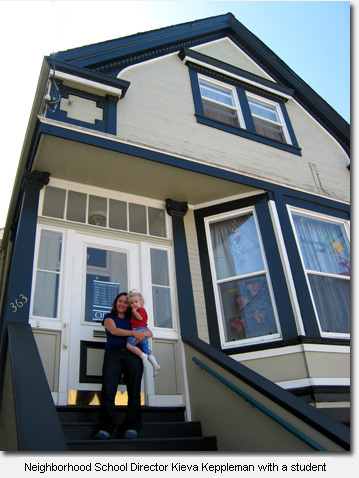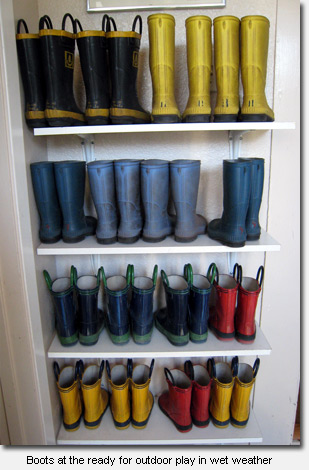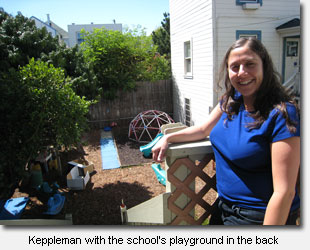 The Richmond District is often referred to as a sleepy neighborhood.
The Richmond District is often referred to as a sleepy neighborhood.
Nothing is more true when you visit the Neighborhood School between 1pm and 3pm on a weekday. You’ll find about a dozen kids napping peacefully in the school’s cozy rooms.
Unlike the calm nirvana that comes over their sleeping children, the parents of the Neighborhood School are fighting a quiet battle to find a new home for their beloved pre-school.
School owner and director, Kieva Keppleman, knows the struggle well. She’s spent the last 3 years looking in vain for a new space to keep her Neighborhood School open.
This isn’t a case of a displeased landlord, as Keppleman tells me “the landlords love that there is a school here”. Rather it’s the “this is life” tale of a school director who has just reached her limit when it comes to living and working in the same place.
Keppleman plans to marry soon, and says the small, shared living quarters and 24/7 immersion with her work probably wouldn’t make for the greatest start. “I share everything” with the school, Keppleman says.
Keppleman opened the Neighborhood School in its current 10th Avenue location in January, 2005. She rents the house where her personal living space is on the small, top floor, while the school occupies the main floor comprised of a dining room, kitchen, school office, and two large living room areas which make up the main rooms of the school. There is also a backyard decked out for playtime.
And while her students’ parents understand Keppleman’s quandry, their attachment to the school and desire to keep it open leaves them conflicted. She paraphrases the parents who tell her: “I love that you’re here. I don’t know how you could live with the school, but could you stay forever?”
The Neighborhood School enrollment is roughly sixteen children, with a class size of twelve on a daily basis. Some are enrolled full-time, 8am to 5:30pm every day, while others are part time. The school’s waiting list numbers between 50 and 75 families; it’s top of the list of many Richmond District families with pre-school age children.
Keppleman owns and directs the school, and employs two part-time teachers, Alyssa and Rachel. One of them speaks fluent Chinese, Spanish and French and Keppleman says parents “appreciate that kind of versatility.”
What makes the school so appealing is its atmosphere and Keppleman’s philosophy on early education. “Our niche is the best of both worlds. They get the pre-school but they also get the family childcare where we have mixed ages, meals, and small groups of twelve,” Keppleman explains. Meals are prepared fresh every day and they are all vegetarian, all organic.
The school also feels like a home to the kids. Keppleman describes how the “rooms look homey, it feels like they’re at home in their living room but there’s only toys, no television, no computers.”
Keppleman’s approach to her tiny clientele is anything but institutional. “We provide high quality care. When [the parents] come here, they know their children are well taken care of. I can tell you anything and everything about each and every child. And I think [the parents] feel very safe and secure with that.”
 It’s a desire to preserve this experience for their children that has motivated a group of the school’s parents to pound the pavement, looking for a new home for the school. The organized group of 5-7 parents is out enlisting real estate agents, calling on their city contacts for help, and generally trying to get the word out about the school’s predicament.
It’s a desire to preserve this experience for their children that has motivated a group of the school’s parents to pound the pavement, looking for a new home for the school. The organized group of 5-7 parents is out enlisting real estate agents, calling on their city contacts for help, and generally trying to get the word out about the school’s predicament.
“They’re looking for space in every place they could possibly look. Churches, random spaces. There’s a Yahoo! Group they put together, and they pow-wow in front of the school after morning drop-offs,” Keppleman tells me.
For many parents, their child’s first turn at education can be a nerve-wracking experience. Finding the right school for their child is time-consuming and stressful. The quality of care across pre-schools varies greatly, wait-lists throw up barriers to the most popular schools, and costs for enrollment run the gamut.
On top of the practical issues with finding the right pre-school, many first-time parents struggle emotionally with leaving their child for up to 8 hours a day in someone else’s care. “This can be a very neurotic time in parents’ lives,” Keppleman explains.
So when she alerted parents at the end of July about her plans to close the school in May, 2010, there was immediate outcry. Keppleman had looked in secret for a new home for the school over the last few years to avoid alarming parents.
Despite her current resolve to close the school, the decision weighs heavily on Keppleman. While her parents are out looking for new space for the school, she’s making calls to other pre-schools to try and find spots for the soon to be displaced families. Most of these families live right in the Richmond District or in the nearby Sunset.
Keppleman also worries that some of the families, frustrated with a lack of quality schools in the area, may decide to move out of not only the Richmond District, but the city itself.
She also regrets that the school will no longer be contributing to the Richmond District community. When the Richmond Library was undergoing renovations, the school donated $2000 towards the construction of the new playground by matching parents’ funds.
In turn, the community has also been part of the school’s growth. Every year, the school holds two fundraisers, one of which is a silent auction. Local businesses like Green Apple Books, Q, Troya, Sports Basement and various hotels contribute packages to the event.
One family loves the school so much that they still support it even though they live in the East Bay and no longer have children at the school. They returned for a fundraiser and made a $500 donation.
On a good year, the school can raise $6,000 in the auction which goes towards school improvement projects like a new backyard and classroom equipment. Or for unexpected safety expenses like paying to paint the backside of a neighbor’s building to eliminate lead-based paint exposure.
But despite all the fans that the Neighborhood School has, finding the right space to move into hs been like looking for a needle in a haystack.
As its current status of a family childcare center, the school’s municipal and federal requirements are less stringent. In 2005, Keppleman was able to find their current location fairly easily, which also came with a supportive landlord.
In order for the Neighborhood School to continue, she’ll need to open a childcare center, which according to state and city laws, has more stringent facility requirements. But she would no longer be required to live on site.
As a childcare center, the school ideally has to be on a bottom floor and if it’s not, sprinklers are required. The space has to have a kitchen, double exits, at least 75 square feet of outdoor space and earthquake retrofitting if it’s been recently renovated.
 When asked if she’ll be able to preserve the character of her school in a commercial space, Keppleman says it all depends on finding the right space.
When asked if she’ll be able to preserve the character of her school in a commercial space, Keppleman says it all depends on finding the right space.
Jim Morris has two daughters currently enrolled at the Neighborhood School. He is not concerned about the school’s transformation into a larger center, saying “[Keppleman] has good co-teachers. If she were to expand, she would have more kids experiencing this style of learning”.
Morris particularly loves the exercise programs the school offers which includes yoga and powercise classes, as well as ample outdoor time in the attached yard.
Even when Keppleman does find a potential property, the landlord may not be willing to rent to the school. “There’s a space at Clement and 22nd. The landlady doesn’t want to rent to a school because it’s higher liability. It has not had earthquake retrofitting. There was lead paint. [Fixing these issues] is not a project that they would consider.”
Keppleman says that it’s the overlapping and sometime contradictory requirements of various municipal and federal offices that make the search particularly difficult.
“The real problem is when you take the state regulations and you mix them with the city, in terms of the building codes, and then you take the third group, the state fire marshal, which mandates things like sprinkler systems…there’s a real problem.”
At this point, Keppleman is relying on her passionate parents to continue the search. While extremely appreciative of their efforts, she is cautiously optimistic.
“I would love to continue the school, but so far we can’t find property that will meet all three types of regulations.”
Do you know of an available space that the Neighborhood School could move into? Leave a comment here or contact us with more information and we’ll pass it onto them.
Sarah B.
I kind of doubt it would work, but the Busvan space on 200 block of Clement has been vacant forever and Michael Busk, the landlord, is a nice guy. . . .
Thanks for the suggestion Pete!
My son attended the Neighborhood School for 3 years and this preschool truly is an amazing Richmond District institution that should not go away. I hope someone in the community can help!
This is perhaps not of interest to Keppleman, but has she considered finding a new place in the neighborhood for herself and her new husband-to-be to live? With all the complications involved in finding a place that works to house the school…it seems it might be much simpler to find a new place for herself and husband? Just a thought…
Hi Sarah (nice name BTW! :),
Unfortunately what you suggest won’t work. The kind of daycare Keiva runs now requires that she live on-site with the school. So if she wants to keep the school as-is, e.g. an in-home setup, she has to live on site. Her moving out is what will trigger the school closing. In order for her to move out and separate her home from the school, she’ll need to find a space which can operate just as a school, with no on-site residency required.
Sarah B.
Hi, is the school still open?
I am a childcare provider and actually if she is married , her husband ahs thte right to have his own place, which means that they both can have a different offcial adress. She can live in her husband’s place and still run her litle school at the other place. I know a lot of childcare providers that do NOT live on the premises because of that “trick”.
sorry for the typo.. I type too fast ..:-(